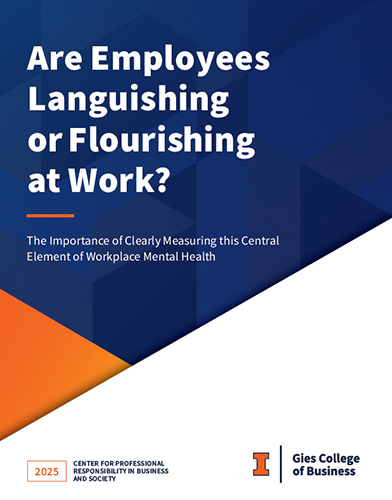
Jan 21, 2025 Accountancy Alumni Business Administration Faculty Finance Research in Education Student
New report from Gies College of Business reveals more employees are languishing than flourishing at work
A new study from Gies College of Business reveals a worrying trend: employees are not doing well mentally and emotionally—more are languishing at work than flourishing. The Workplace Well-Being Report, the first of its kind to comprehensively survey the prevalence of flourishing and languishing among employees, highlights a significant gap in our understanding of mental health in the workplace.
Coauthored by Oscar Ybarra, professor of business administration and director of the Center for Professional Responsibility in Business and Society (CPRBS) at Gies Business, the report emphasizes that workplace mental health involves more than just the absence of mental illness – it requires actively fostering mental well-being.

"Most people tend to think of mental illness, or its absence, as what mental health is, so half of the picture is getting missed," said Ybarra. "Well-being – whether someone is languishing or flourishing – represents the other side of mental health."
Researchers at CPRBS surveyed more than 2,000 individuals across various industries to better understand how flourishing and languishing manifest in today's workforce. The data reveal that many employees are not thriving: 57% of respondents report languishing at work, while 43% report flourishing. The findings also indicate that workplace well-being is distinct from how a person is functioning in life outside of work. Employees might languish at work – struggling with motivation, engagement, and fulfillment in their roles – while flourishing in their personal lives.
Rates of languishing were comparable across four of the five age groups, demonstrating that languishing affects employees regardless of experience or career stage. Additionally, languishing cut across levels of education, income, gender, and race/ethnicity, underscoring its pervasiveness.
Understanding the distinction between languishing and flourishing is essential for creating a supportive work environment. Because flourishing serves as a resource when life's stressors pile up, languishing means greater vulnerability to those challenges.
"Well-being, when it is positive, serves as a resource to protect against the stressors at work," said Ybarra. In contrast, "if well-being is low, that is, if employees are languishing...this becomes a risk factor for developing mental illness because it's hard to fend off these stressors."
Languishing at work isn't just a matter of performance indicators or frustration – it deeply affects employees' experience of their roles.
"At the personal level, someone who is languishing will feel like they have little say in what they do, that they are not currently staying on top of their work, or that they are stagnating and not growing in their jobs or careers," said Ybarra. “This goes beyond finding out that they are not engaged and gets more at the reasons for it.”
The report demonstrates that languishing employees may struggle with concentration, face higher levels of psychological distress, and experience emotional burnout. These factors are related to decreased job satisfaction, lower engagement, and higher turnover intentions.
But the costs don't end there: languishing has consequences for an organization's overall health.
"In terms of the social aspects of work, employees who are languishing feel like they are not making a contribution to their group or organization,” said Ybarra. "They may not feel like they are a part of a community at work, or that the way their organization operates doesn’t make sense to them."
Languishing employees may also perceive weak ethical guidelines or a lack of articulated values, reducing their connection to the organization’s mission and goals. Negative perceptions of leadership were also identified as contributing to languishing. Positive and supportive leadership is key to creating a flourishing workplace.
As well, broader organizational attitudes toward autonomy and support also play a key role. When these elements align positively, employees are more empowered to flourish. In what the researchers call a “Q4” or “empowered” team, employees have both the autonomy to make decisions and a support system to back them up. Under these conditions – high in autonomy and care – employees consistently flourish.
Learning that employees are languishing may be disappointing, but it also reveals an opportunity for both employees and employers.
"Once you have a sense of how employees are doing," said Ybarra, "then the task is to inform them of resources or create some interventions."
Encouraging flourishing can be as simple as meeting an employee's needs.
"A person who feels they are not growing may be a good candidate for receiving additional responsibilities or a switch in duties to gain additional experience. An employee who doesn't feel like they are part of a community at work may benefit from more opportunities to meet others and collaborate with other employees."
The report's findings are a call to action for business leaders. Addressing employee well-being goes beyond addressing mental illness and is directly tied to how organizations function on a day-to-day level. It's about creating a thriving work culture where people feel they are able to meet the personal challenges of work and career, while also being able to maintain supportive relations with co-workers, supervisors, and the organization as a whole.
"Employees who get their mental well-being needs met will be more productive and loyal to the organization," said Ybarra.
Importantly, those benefits extend beyond the office. Employees who flourish at work are more resilient, better equipped to handle stress, and more likely to bring their best selves to everything they do.
"By making workplaces supportive for employees so they no longer languish and they start to flourish," said Ybarra, "a company or organization's culture shifts to one where employees can build up the social and psychological resources needed to more effectively meet stressors in life outside of work."
